I spend a lot of time reading. And, for as long as my messed up hands keep me from being able to type as much as I’d like, I’ll be spending even more time reading than usual. Here, in case you’re looking for something good to read, are some of the books I’ve gone through in the past couple of weeks. All of these are general market books, but I do read Christian books as well—it’s just that I tend to write full-length reviews of those ones, like here, here, and here.
(If you are reading this via email newsletters, perhaps click through to my site to get better formatting and working links.)
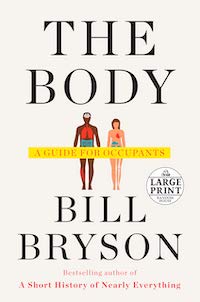 The Body: A Guide for Occupants by Bill Bryson. This is easily one of the most interesting books I’ve read in a long time. In it Bryson, a well known and extremely talented author, provides a fascinating tour of the human body. He explores some of its mysteries, describes some of the amazing facts we’ve learned about it, and reveals just how much of it still remains a total mystery. For all the medical advances we’ve made over the past few centuries, and even the past few decades, there is still so much we just don’t understand. Be warned that Bryson is occasionally antagonistic, and maybe even mocking, toward those who insist there is some kind of intelligence behind the human body. Yet he himself cannot help but use “created” and “engineered” and “miracle” and a lot of other words that aren’t fully consistent with the human body coming together by little more than time and chance. While he gives all the glory to evolution, it doesn’t take much for a Christian like me to see a far greater and higher power behind it all, and to give him praise for what he’s done. (Amazon)
The Body: A Guide for Occupants by Bill Bryson. This is easily one of the most interesting books I’ve read in a long time. In it Bryson, a well known and extremely talented author, provides a fascinating tour of the human body. He explores some of its mysteries, describes some of the amazing facts we’ve learned about it, and reveals just how much of it still remains a total mystery. For all the medical advances we’ve made over the past few centuries, and even the past few decades, there is still so much we just don’t understand. Be warned that Bryson is occasionally antagonistic, and maybe even mocking, toward those who insist there is some kind of intelligence behind the human body. Yet he himself cannot help but use “created” and “engineered” and “miracle” and a lot of other words that aren’t fully consistent with the human body coming together by little more than time and chance. While he gives all the glory to evolution, it doesn’t take much for a Christian like me to see a far greater and higher power behind it all, and to give him praise for what he’s done. (Amazon)
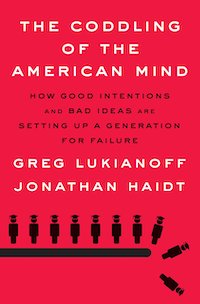 The Coddling of the American Mind: How Good Intentions and Bad Ideas Are Setting Up a Generation for Failure by Greg Lukianoff and Jonathan Haidt. There’s no doubt that something unusual is happening on college campuses across America and beyond. There are growing rates of depression and suicide; there are outbreaks of violence in attempts to squelch free speech on campus; there is a kind of fear that seems to be related to the fragility of students, as if any idea that challenges them does violence to them. It is an uncertain time and Lukianoff and Haidt think they know why. Writing from a centrist to liberal perspective, but with a lot of care and objectivity, they propose that the great majority of the problems can be traced back to three bad ideas pervading universities today: The untruth of fragility (that what doesn’t kill you makes you weaker); the untruth of emotional reasoning (that you should always trust your feelings); and the untruth of us versus them (that life is a battle between good people and evil people). They make a very good case. And as they do so, they explore the growing culture of intimidation and violence on campuses, the rise of witch hunts, and so on. It is written with an evolutionary worldview, so you’ll need to do some “translation.” But if you want to better understand what’s happening in universities today, and how it is spreading far beyond them, you won’t do much better than this book. (Amazon)
The Coddling of the American Mind: How Good Intentions and Bad Ideas Are Setting Up a Generation for Failure by Greg Lukianoff and Jonathan Haidt. There’s no doubt that something unusual is happening on college campuses across America and beyond. There are growing rates of depression and suicide; there are outbreaks of violence in attempts to squelch free speech on campus; there is a kind of fear that seems to be related to the fragility of students, as if any idea that challenges them does violence to them. It is an uncertain time and Lukianoff and Haidt think they know why. Writing from a centrist to liberal perspective, but with a lot of care and objectivity, they propose that the great majority of the problems can be traced back to three bad ideas pervading universities today: The untruth of fragility (that what doesn’t kill you makes you weaker); the untruth of emotional reasoning (that you should always trust your feelings); and the untruth of us versus them (that life is a battle between good people and evil people). They make a very good case. And as they do so, they explore the growing culture of intimidation and violence on campuses, the rise of witch hunts, and so on. It is written with an evolutionary worldview, so you’ll need to do some “translation.” But if you want to better understand what’s happening in universities today, and how it is spreading far beyond them, you won’t do much better than this book. (Amazon)
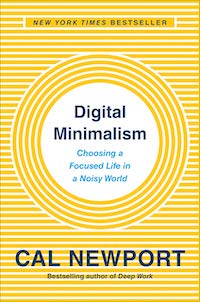 Digital Minimalism: Choosing a Focused Life in a Noisy World by Cal Newport. If my relationship with my wife was anything like my relationship with my phone, I’m pretty sure we would have gone for counseling ages ago. I’m pretty sure our kids and friends would have begged us to. But somehow I tolerate—we all tolerate—so much from our phones. They demand to be the first thing we look at in the morning and the last thing we look at before bed. And between the two, they are constantly in our hands and before our eyes. Of course our phones are just the medium through which we encounter the never-ending stream of tweets and texts and notifications that distract us. They are for productivity, entertainment, infotainment, communication, devotion, education, and just about anything else. But mostly they are just for distraction. Either way, Newport’s Digital Minimalism is a call to take control of the relationship by massively reducing our dependency on our digital devices and social media platforms. His thoughts are helpful, his challenges, well, challenging. My guess is that many people try but few succeed. Still, it’s worth the attempt. (Amazon)
Digital Minimalism: Choosing a Focused Life in a Noisy World by Cal Newport. If my relationship with my wife was anything like my relationship with my phone, I’m pretty sure we would have gone for counseling ages ago. I’m pretty sure our kids and friends would have begged us to. But somehow I tolerate—we all tolerate—so much from our phones. They demand to be the first thing we look at in the morning and the last thing we look at before bed. And between the two, they are constantly in our hands and before our eyes. Of course our phones are just the medium through which we encounter the never-ending stream of tweets and texts and notifications that distract us. They are for productivity, entertainment, infotainment, communication, devotion, education, and just about anything else. But mostly they are just for distraction. Either way, Newport’s Digital Minimalism is a call to take control of the relationship by massively reducing our dependency on our digital devices and social media platforms. His thoughts are helpful, his challenges, well, challenging. My guess is that many people try but few succeed. Still, it’s worth the attempt. (Amazon)
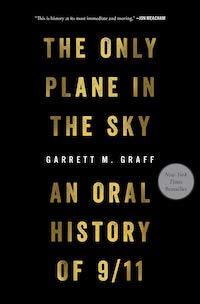 The Only Plane in the Sky: An Oral History of 9/11 by Garrett Graff. All of us who are 30 or older have a 9/11 story. We all remember who we were with and what we were doing when we first heard the news. We all have memories of the horror of seeing such terrible events unfold on the screens in front of us. Few days have shaped the modern world like that day. The Only Plane in the Sky is an oral history of 9/11. In most cases, the people telling their stories are the ones who were on the scenes or who were making the big decisions. Thus accounts come from people who were in the Twin Towers or in the Pentagon, air traffic controllers, politicians, members of the press traveling with President Bush, family members of passengers aboard the doomed airliners, and, of course, first responders. The book, which reads like both history and current events, captures much of the uncertainty, terror, chaos, and importance of the day. It is gripping, it is fascinating, and it is so very sad. In its own way, it is an important contribution to better understanding and assessing the day that changed so much. (Amazon)
The Only Plane in the Sky: An Oral History of 9/11 by Garrett Graff. All of us who are 30 or older have a 9/11 story. We all remember who we were with and what we were doing when we first heard the news. We all have memories of the horror of seeing such terrible events unfold on the screens in front of us. Few days have shaped the modern world like that day. The Only Plane in the Sky is an oral history of 9/11. In most cases, the people telling their stories are the ones who were on the scenes or who were making the big decisions. Thus accounts come from people who were in the Twin Towers or in the Pentagon, air traffic controllers, politicians, members of the press traveling with President Bush, family members of passengers aboard the doomed airliners, and, of course, first responders. The book, which reads like both history and current events, captures much of the uncertainty, terror, chaos, and importance of the day. It is gripping, it is fascinating, and it is so very sad. In its own way, it is an important contribution to better understanding and assessing the day that changed so much. (Amazon)
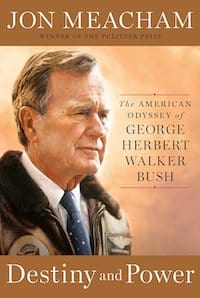 Destiny and Power: The American Odyssey of George Herbert Walker Bush by Jon Meacham. Though this biography was written before the death of George H.W. Bush in 2018, it was written close enough that it can be considered a definitive account of the life of America’s 41st president. Notably, it is also considered the official biography of Bush, since Meacham was selected by the Bush family and then given increased access to journals, diaries, interviews, and other key sources. Meacham is a world-class biographer who has previously written on Jefferson, Jackson and others. This lengthy work on Bush 41 is largely positive in tone and sympathetic to a leader who felt overlooked, concerned that history would regard him as little more than a mere footnote between two other much more noteworthy presidents. And, indeed, his fears were not necessarily irrational, coming as he did between Reagan and Clinton, and coming before presidencies that were in some ways more noteworthy for various reasons: Bush 43, Obama, and Trump. Meacham’s work gives him his due as a president (and vice president and ambassador and congressman). It is thoroughly enjoyable and comes highly recommended. (Amazon)
Destiny and Power: The American Odyssey of George Herbert Walker Bush by Jon Meacham. Though this biography was written before the death of George H.W. Bush in 2018, it was written close enough that it can be considered a definitive account of the life of America’s 41st president. Notably, it is also considered the official biography of Bush, since Meacham was selected by the Bush family and then given increased access to journals, diaries, interviews, and other key sources. Meacham is a world-class biographer who has previously written on Jefferson, Jackson and others. This lengthy work on Bush 41 is largely positive in tone and sympathetic to a leader who felt overlooked, concerned that history would regard him as little more than a mere footnote between two other much more noteworthy presidents. And, indeed, his fears were not necessarily irrational, coming as he did between Reagan and Clinton, and coming before presidencies that were in some ways more noteworthy for various reasons: Bush 43, Obama, and Trump. Meacham’s work gives him his due as a president (and vice president and ambassador and congressman). It is thoroughly enjoyable and comes highly recommended. (Amazon)
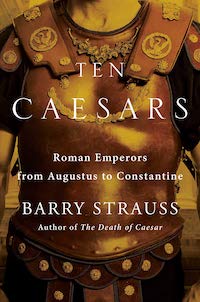 Ten Caesars: Roman Emperors from Augustus to Constantine by Barry Strauss. You can’t understand the modern world without at least some understanding of the ancient world, and you can’t understand the ancient world without at least some understanding of the Roman Empire. This is true if you are attempting to understand the history of the world or the history of Christianity, for both emerge from Rome. In Ten Caesars, Barry Strauss introduces ten of the most formative emperors. He begins with Augustus, the first emperor and the one who was in power when Jesus was born, and ends with Constantine, the first emperor to legalize and profess the Christian faith. Between them he introduces some of the other key leaders, including Tiberius, Nero, Trajan, Marcus Aurelius, and Diocletian. In every case he provides a short, fast-paced, and lively biography that describes that leader’s life and impact. If this was the only Roman history you were to ever read, you’d at least have a solid understanding of how the Empire rose and fell and how it impacted the history of this world and the history of the Christian faith. (Amazon)
Ten Caesars: Roman Emperors from Augustus to Constantine by Barry Strauss. You can’t understand the modern world without at least some understanding of the ancient world, and you can’t understand the ancient world without at least some understanding of the Roman Empire. This is true if you are attempting to understand the history of the world or the history of Christianity, for both emerge from Rome. In Ten Caesars, Barry Strauss introduces ten of the most formative emperors. He begins with Augustus, the first emperor and the one who was in power when Jesus was born, and ends with Constantine, the first emperor to legalize and profess the Christian faith. Between them he introduces some of the other key leaders, including Tiberius, Nero, Trajan, Marcus Aurelius, and Diocletian. In every case he provides a short, fast-paced, and lively biography that describes that leader’s life and impact. If this was the only Roman history you were to ever read, you’d at least have a solid understanding of how the Empire rose and fell and how it impacted the history of this world and the history of the Christian faith. (Amazon)
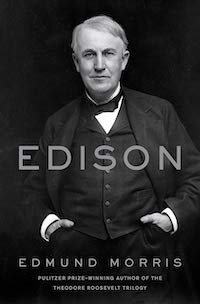 Edison by Edmund Morris. The latest (and final, I presume) biography by Edmund Morris tells the life of the great American inventor Thomas Edison. It is extremely well-written and provides a thorough but not exhausting account of Edison’s life. Morris makes it clear that Edison was both a great man (in his scientific endeavors) and a seriously flawed man (in his business and family endeavors). The reader will have to decide for himself whether he appreciates Morris’s novel decision—which is never explained—to tell his subject’s story in reverse, from death to birth, rather than in the more traditional and logical order of birth to death. Personally, if I had to read the book again, I’d read the chapters in reverse order. That annoyance aside, and it is a pretty significant one, this is otherwise an excellent biography of a fascinating and important character who, in his own way, is responsible for creating much of what we take for granted in the modern world. (Amazon)
Edison by Edmund Morris. The latest (and final, I presume) biography by Edmund Morris tells the life of the great American inventor Thomas Edison. It is extremely well-written and provides a thorough but not exhausting account of Edison’s life. Morris makes it clear that Edison was both a great man (in his scientific endeavors) and a seriously flawed man (in his business and family endeavors). The reader will have to decide for himself whether he appreciates Morris’s novel decision—which is never explained—to tell his subject’s story in reverse, from death to birth, rather than in the more traditional and logical order of birth to death. Personally, if I had to read the book again, I’d read the chapters in reverse order. That annoyance aside, and it is a pretty significant one, this is otherwise an excellent biography of a fascinating and important character who, in his own way, is responsible for creating much of what we take for granted in the modern world. (Amazon)
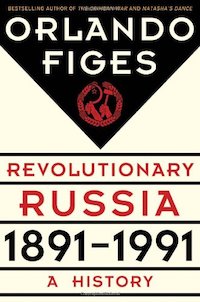 Revolutionary Russia: 1891-1991 by Orlando Figes. One of the areas to which I’ve been devoting a good bit of my reading attention is the rise of socialism and communism and, for that, there’s no better study than Soviet Russia. I’ve been studying this because I have been hearing so much about the rise of a new kind of totalitarianism in Western nations today (what Rod Dreher, for example, has termed ‘soft totalitarianism’), and assume there will be benefit in studying true totalitarianism. Revolutionary Russia is a short study of an extremely complicated period of history—the era of communism in Russia. It spans a 100-year period, beginning well before the revolution and ending with the destruction of the Berlin Wall. Figes is extremely knowledgeable on this topic and does a good job of condensing it to a few hundred pages. Though I found the book got off to a bit of a slow start, it soon became captivating. (Amazon)
Revolutionary Russia: 1891-1991 by Orlando Figes. One of the areas to which I’ve been devoting a good bit of my reading attention is the rise of socialism and communism and, for that, there’s no better study than Soviet Russia. I’ve been studying this because I have been hearing so much about the rise of a new kind of totalitarianism in Western nations today (what Rod Dreher, for example, has termed ‘soft totalitarianism’), and assume there will be benefit in studying true totalitarianism. Revolutionary Russia is a short study of an extremely complicated period of history—the era of communism in Russia. It spans a 100-year period, beginning well before the revolution and ending with the destruction of the Berlin Wall. Figes is extremely knowledgeable on this topic and does a good job of condensing it to a few hundred pages. Though I found the book got off to a bit of a slow start, it soon became captivating. (Amazon)
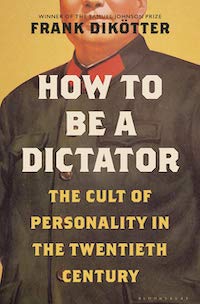 How To Be a Dictator: The Cult of Personality in the Twentieth Century by Frank Dikotter. The twentieth century may have been nearly unprecedented as the century that saw so many cults of personality lead to so many brutal dictatorships. In How To Be a Dictator, historian Frank Dikotter offers brief biographies of 8 of these dictators: Mussolini (Italy), Hitler (Germany), Stalin (Russia), Mao Zedong (China), Kim Il-sung (North Korea), Duvalier (Haiti), Ceausescu (Romania), and Mengistu (Ethiopia). He does not follow a standard format attempt to draw the same lessons from each. Rather, he simply describes the context in which that person gained his position, then tells about his rule, and how it all came to an end. These mini-biographies are just the right size—perhaps 30 pages on average—to give a taste and let you decide if you’d like to read a full-length work on that person. I enjoyed reading every page. (Amazon)
How To Be a Dictator: The Cult of Personality in the Twentieth Century by Frank Dikotter. The twentieth century may have been nearly unprecedented as the century that saw so many cults of personality lead to so many brutal dictatorships. In How To Be a Dictator, historian Frank Dikotter offers brief biographies of 8 of these dictators: Mussolini (Italy), Hitler (Germany), Stalin (Russia), Mao Zedong (China), Kim Il-sung (North Korea), Duvalier (Haiti), Ceausescu (Romania), and Mengistu (Ethiopia). He does not follow a standard format attempt to draw the same lessons from each. Rather, he simply describes the context in which that person gained his position, then tells about his rule, and how it all came to an end. These mini-biographies are just the right size—perhaps 30 pages on average—to give a taste and let you decide if you’d like to read a full-length work on that person. I enjoyed reading every page. (Amazon)
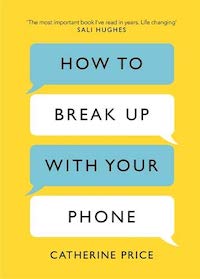 How to Break Up with Your Phone by Catherine Price. I think most of us are uncomfortable with our relationship with our phones. And if we’re not uncomfortable with our own relationship, we’re probably uncomfortable on behalf of a spouse or child. Some of us need to “break up” with our phones, and that’s what this book is all about. To be clear, the author doesn’t advocate getting rid of our phones altogether, but rather advocates developing a more healthy relationship with them. This book is roughly half theory and half method. On the theory side, there is not much here that hasn’t been included in a hundred other books—it’s essentially a summary of current works on technology. On the method side, there are some good ideas for loosening the grip of our phones. That said, there is a substantial emphasis on the “mindfulness” that is so popular today and that is not likely to pay the dividends the author thinks it will. Still, you’d do well to read the book and consider its approach to working out a better relationship with your omnipresent phone. (Amazon)
How to Break Up with Your Phone by Catherine Price. I think most of us are uncomfortable with our relationship with our phones. And if we’re not uncomfortable with our own relationship, we’re probably uncomfortable on behalf of a spouse or child. Some of us need to “break up” with our phones, and that’s what this book is all about. To be clear, the author doesn’t advocate getting rid of our phones altogether, but rather advocates developing a more healthy relationship with them. This book is roughly half theory and half method. On the theory side, there is not much here that hasn’t been included in a hundred other books—it’s essentially a summary of current works on technology. On the method side, there are some good ideas for loosening the grip of our phones. That said, there is a substantial emphasis on the “mindfulness” that is so popular today and that is not likely to pay the dividends the author thinks it will. Still, you’d do well to read the book and consider its approach to working out a better relationship with your omnipresent phone. (Amazon)










